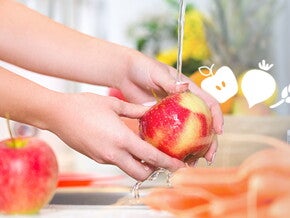
What Does Organic Really Mean – Really?
Did you know? In a global survey, 30% of respondents looked for organic qualities when shopping.
What does organic mean for my baby?
But what does ‘organic’ really mean and how does it influence the food choices you make for you and your family?
Although the term ‘organic’ can mean slightly different things in different countries, it is generally understood to be a way of producing food that has the environment at its heart. According to the International Federation of Organic Agriculture Movement, “Organic agriculture is a production system that sustains the health of soils, ecosystems, and people. It relies on ecological processes, biodiversity and cycles adapted to local conditions, rather than the use of inputs with adverse effects.”
For a food or drink to be certified ‘organic,’ it must meet certain requirements in the way it has been produced, stored, processed, handled, and marketed, and it must be certified by an external agency. This applies not just to the food or drink manufacturer, but to everyone involved in the process, including farmers and retailers. For example, foods labeled ‘organic’ must consist of at least 95% organically produced ingredients, excluding water and salt. Any remaining ingredients must be made up of non-agricultural substances which are approved on a national list.
Organic baby food
Food quality is particularly important for your growing baby as every mouthful counts towards her healthy development. That’s why some baby-food manufacturers go above and beyond the standards set for organic produce. This includes adopting special practices to guide the way they select their seeds and land, and not using any synthetic pesticides to maintain crops. Some baby-food manufacturers monitor their products throughout the entire process—from the field to your baby’s plate— by performing up to 100 different checks to guarantee the safety and quality of their baby organic foods. They also work closely with local farmers and suppliers so their key ingredients can be easily traced back to how and where they were grown.
Buying organic is an increasingly popular choice, which for many people means tasty food that has been processed in an environmentally friendly and socially responsible way. Some moms opt for baby organic because they don’t want to offer their little one food that has been grown using synthetic pesticides and fertilizers. Others may be concerned with the future of animal and plant life, as well as how the animals are treated—organic production systems have very clear rules for animal welfare. Some parents simply like to know exactly where the food they’re offering their baby has come from.
Whatever decision you make for your baby when it comes to organic food, ensure everything you offer her is as nutritious and varied as possible to give her a healthy head start in life.
Sources
https://www.ifoam.bio/en/our-library/organic-basics (Accessed April 9 2018)
https://www.mayoclinic.org/healthy-lifestyle/infant-and-toddler- health/expert-answers/organic-baby-food/faq-20058008 (Accessed April 9 2018)
Mie A, Andersen HR, Gunnarsson S, et al. Human health implications of organic food and organic agriculture: a comprehensive review. Environ Health 2017; 16(1):111 doi:10.1186/s12940-017-0315-4
Reganold JP, Wachter JM. Organic agriculture in the twenty-first century. Nat Plants 2016; 2:doi:10.1038/nplants.2015.221


















